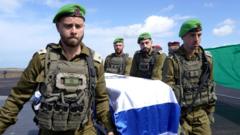The recent controversy regarding hostages taken by Hamas exacerbates the already fragile relations and cease-fire arrangements between Israel and the militant group.
### Tensions Rise Over Hamas Hostage Incident

### Tensions Rise Over Hamas Hostage Incident
Concerns grow as Hamas claims to have returned hostages, but disputes arise over the identification of the bodies.
In a recent development, Israel has disputed claims made by Hamas regarding the identification of remains returned as part of a cease-fire negotiation. The Palestinian militant group reported it had handed over the remains of four hostages, including Shiri Bibas and her two young children. This announcement was part of a larger agreement stemming from escalating tensions following the October 2023 attacks, which have strained Israeli-Palestinian relations.
Hamas stated that the four individuals were returned as a result of ongoing negotiations, suggesting they had perished due to Israeli military actions. The identified remain of Oded Lifshitz, 83, alongside the Bibas children, was confirmed by Israeli authorities through DNA tests, semantically identifying them as victims of the hostage incident. However, the identity of Shiri Bibas remains contentious, as Israel has reported that the body returned does not match that of the Israeli woman.
During a televised ceremony, Hamas delivered coffins to the International Committee of the Red Cross, showcasing photographs of the supposed hostages alongside the remains. The sight of Ms. Bibas, who was captured alongside her children during the October assault, has left an indelible mark on Israeli society. The emotional weight surrounding the Bibas family's plight reflects the broader humanitarian crises stemming from the conflict.
The unfolding scenario has raised alarms about the viability of the cease-fire reached between the two entities. The circumstances surrounding the hostage situations not only place a spotlight on Hamas's operational transparency but also on Israel's responses, with mounting concerns regarding potential future escalations.
As this situation continues to evolve, it underscores the complexity of the humanitarian and political landscape in the region. The potential fallout from this incident may further change the delicate dynamics between Gaza and Israel, making resolution seem even more distant.
Hamas stated that the four individuals were returned as a result of ongoing negotiations, suggesting they had perished due to Israeli military actions. The identified remain of Oded Lifshitz, 83, alongside the Bibas children, was confirmed by Israeli authorities through DNA tests, semantically identifying them as victims of the hostage incident. However, the identity of Shiri Bibas remains contentious, as Israel has reported that the body returned does not match that of the Israeli woman.
During a televised ceremony, Hamas delivered coffins to the International Committee of the Red Cross, showcasing photographs of the supposed hostages alongside the remains. The sight of Ms. Bibas, who was captured alongside her children during the October assault, has left an indelible mark on Israeli society. The emotional weight surrounding the Bibas family's plight reflects the broader humanitarian crises stemming from the conflict.
The unfolding scenario has raised alarms about the viability of the cease-fire reached between the two entities. The circumstances surrounding the hostage situations not only place a spotlight on Hamas's operational transparency but also on Israel's responses, with mounting concerns regarding potential future escalations.
As this situation continues to evolve, it underscores the complexity of the humanitarian and political landscape in the region. The potential fallout from this incident may further change the delicate dynamics between Gaza and Israel, making resolution seem even more distant.




















